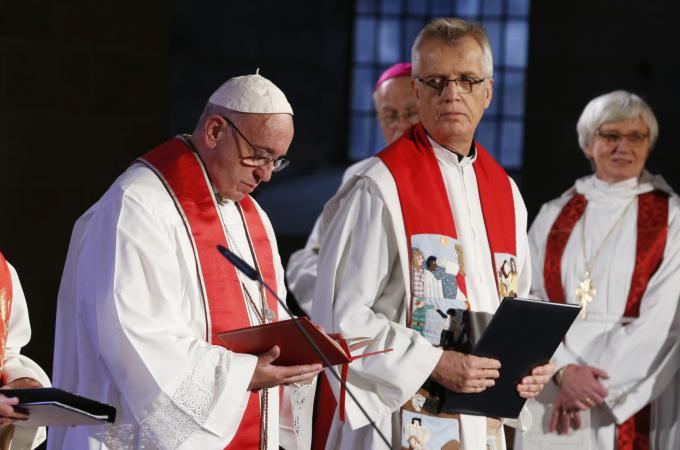The Protestant and Catholic Reformations
In the past year there's been a series of events -- especially in Europe -- leading up to the 500th anniversary of the Protestant Reformation on Oct. 31. It was an event that set off more than a century of religious warfare and changed the practice of Christianity worldwide.
At a joint Lutheran and Catholic commemoration of the Reformation a year ago in Lund, Sweden, Pope Francis urged atonement and Christian reconciliation. Care has been taken in the promotion of these ecumenical events to counter-balance the word normally used on anniversaries -- celebration -- with the words commemoration and repentance.
Attention should also be given to the fact that it was not just an era of reformation initiatives by Protestants, but by Catholics as well. As Pope Francis noted in his remarks in Lund, Luther's protest of the sale of indulgences had a beneficial impact on Catholicism.
"With gratitude we acknowledge that the Reformation helped give greater centrality to sacred Scripture in the Church's life," the pope said inn a joint declaration at Lund Cathedral with Bishop Munib A. Younan, the head of the Evangelical Lutheran Church in Jordan and the Holy Land and the president of the Lutheran World Federation.
To acknowledge the need for reform within the Catholic Church at the time, one only need look at the 16th century Council of Trent. The Council proved very difficult to convoke because popes saw councils as potentially undermining papal authority.
Earlier councils, such as Constance in the 1400s, had been called by the emperor, who had long-standing claims to leadership of the Christian world that rivaled those of the pope. Conciliar rule had the potential to sideline the papacy.
Further, Catholics in different areas of Europe not surprisingly had diverse perspectives about reform, which raised papal concern that a council might result in stimulating new conflicts rather than resolving present ones.
When Pope Paul III finally called the council in the early 1540s, it took over three years to get up and going, eventually meeting in three phases over the next 18 years. The popes who occupied the Chair of Peter during that time did not attend, but simply oversaw it through reports sent back to Rome by their cardinal-legates.
Even before the Reformation, many had longed for a reform of institutional corruption. Certain popes had been noted for using their office to promote family members and privilege their relatives with jobs and finances.
There were also instances of priests and bishops not residing in the areas of their appointments but all the while receiving income for "holding the title." Neither was there an educational standard. One of the actions taken by the Council of Trent was to establish strong seminaries to provide a more educated clergy with deeper spiritual lives.
In the end, Trent was not merely a reaction to Protestantism but an occasion for clarification and affirmation of Catholic teachings.
For 16th century Catholics, who were reeling from the devastating divisions taking place within the European church, an effective way to heal was to instill in clergy and laity the desire for a more devout life.
As Lutheran theologian Martin Lohrmann has observed, "Trent had a long-lasting, unifying effect. The primacy of the pope survived a great challenge. The focus on bishops and priests serving local communities brought renewed attention to grassroots faith. The invention of seminaries gave new shape to the formation and education of clergy. And the church's patterns of doctrine and worship remained unchallenged until the equally monumental Second Vatican Council 400 years later."
There were various leading advocates in the Catholic reformation. To mention but three: Ignatius Loyola (1491-1556) founded the Society of Jesus which became one of the most successful proponents of a reinvigorated Catholic spirituality, with Jesuits developing the Church's most prestigious educational systems.
Teresa of Avila (1515-1582), a Spanish mystic, reformed her order of Carmelite nuns, and along the way became friends with John of the Cross who founded a monastery for men along the lines of Teresa's reforms. The writings of both of them continue to have a profound influence on Catholic spirituality today.
In short, the Reformation includes both Protestants and Catholics who today are growing closer. Instead of occasioning thinking about the differences that separate us, the events of this Reformation anniversary provide us with opportunities to come together in prayer and join hands in service of the gospel mission given to us by our common Lord and Savior, Jesus Christ.
- Father Thomas Ryan, CSP, directs the Paulist North American Office for Ecumenical and Interfaith Relations in Boston.



















